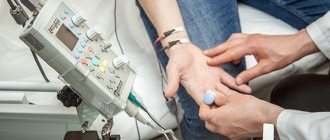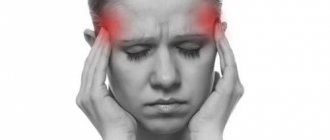Numbness is an abnormal sensation that can occur in any part of the body, but is most often felt in the arms and legs. The symptom of numbness is often accompanied by tingling, and can be quite harmless, for example, in the hands when cooling, to a sign of a serious, life-threatening condition. Numbness is a fairly common symptom. Numbness of the limbs is often accompanied by an emotional context with a feeling of detachment and decreased emotional coloring, which is usually a sign of depression. In a physical context, numbness is usually the result of damage, poor circulation, or pathological changes to certain nerves.
In addition, there may be periodic attacks of numbness and tingling due to the presence of certain health problems, such as neuroses or a migraine attack. Also, episodes of numbness can occur during attacks of fear caused by the anticipation of life-threatening events, and in such cases the numbness is caused by shallow breathing and most often affects the fingers and the mouth area.
Numbness of the hands is manifested by a feeling of loss of sensation in the hands; patients often call this condition “asleep” hands. Numbness may be accompanied by a tingling sensation from the needle. Often such numbness occurs after sleeping with your hands under your head. Numbness in the hands is usually caused by carpal tunnel syndrome, which causes compression of the median nerve. Most often, carpal tunnel syndrome is caused by compression of the nerve in the carpal tunnel. In addition, numbness in the hands can be caused by injuries, hypothermia, or systemic diseases such as diabetes. If numbness of the hands is accompanied by shortness of breath, nausea, and palpitations, then this may be a sign of acute, life-threatening conditions and requires emergency medical attention.
Numbness in the legs is a loss of feeling or sensation in the legs, resulting from disruption of communication between the peripheral nerves and the central nervous system. Typically, numbness in the legs is associated with poor circulation in the lower extremities. This numbness most often occurs when sitting cross-legged for a long period of time. In such cases, getting up and walking can relieve the numbness after a while. But numbness in the legs can also be a sign of serious damage to nerve fibers due to mechanical factors (disc herniation, radiculopathy) or nerve damage due to somatic diseases.
Causes
Numbness can be a sign of a wide range of diseases or conditions that involve restricted blood flow or nerve damage.
Temporary numbness can be caused by any activity that puts prolonged pressure on the nerve(s), such as sitting cross-legged or cycling long distances. Numbness can also occur due to moderate to severe orthopedic or vascular pathology, as well as conditions and diseases that lead to damage to the nervous system. In some cases, numbness is a symptom of a life-threatening condition that requires emergency medical attention.
Cardiovascular causes of numbness
Numbness can be caused by a lack of blood flow to a certain area due to conditions such as:
- Arteriovenous malformations
- Buerger's disease
- Deep vein thrombosis (a blood clot in the legs can break off, which can lead to pulmonary embolism in the lungs, heart attack, stroke)
- Frostbite
- Diseases of peripheral arteries (vascular atherosclerosis, in which narrowing of the arterial bed occurs).
- Raynaud's syndrome, in which persistent spasm of peripheral vessels occurs and blood circulation in the distal extremities is impaired. Vasospasm is usually triggered by cold or sometimes stress.
Orthopedic causes of numbness
Numbness may also occur due to minor or serious orthopedic conditions that cause nerve damage:
- Whiplash neck injury
- Bone fractures
- Carpal tunnel syndrome
- Degenerative diseases of the intervertebral disc
- Herniated disc
- Compression pinched nerve
- Osteoporosis
Neurological causes of numbness
Numbness due to nerve compression or nerve damage may be due to conditions such as:
- Alcoholism
- Brain tumors
- Diabetic neuropathy
- Encephalitis
- Heavy metal poisoning such as lead poisoning
- Hypothyroidism
- Multiple sclerosis
- Peripheral neuropathy
- Spinal cord injury or tumor
- Stroke
- Systemic lupus erythematosus
- Myelitis
- Myelopathy
- Vitamin B12 deficiency
Numbness during pregnancy
Pregnant women face many changes in the body, and numbness is one of them. Some pregnant women develop carpal tunnel syndrome and it is believed to be due to water retention in the body during pregnancy.
As the fetus develops, fluid accumulates in the body, tissues swell, including in the wrist area, compression of the median nerve occurs and carpal tunnel syndrome develops. Symptoms of carpal tunnel syndrome are more pronounced in the morning hours, as fluid accumulates in the body at night. As a rule, carpal tunnel syndrome in pregnant women heals on its own after delivery.
Numbness in children
There are many reasons why children may experience numbness in different parts of the body. Eating disorders, lack of vitamins and minerals can cause numbness in the lower extremities, this is especially typical for a deficiency of B vitamins. Sports injuries can also cause numbness. Therefore, in childhood, parents need to pay attention to children’s complaints of numbness, which lasts more than a few minutes and may be a sign of damage to ligaments, tendons or bone fractures. Often, anxiety in childhood can be a source of numbness in the lips and face.
Why your hands go numb in your sleep: mechanisms of paresthesia
Lack of blood supply . From a simply uncomfortable position, narrow pajama sleeves, a sedentary lifestyle to blockage of small and medium-sized vessels with cholesterol plaques and Volkmann’s ischemic contracture.
Neurological diseases . Destruction of the myelin sheath, disruption of conductivity and trophism, inflammation, overload, toxin poisoning are factors affecting the failure of the transmission of nerve impulses.
Lack of vitamins , microelements; hypovitaminosis, less often vitamin deficiency. The propagation of a signal between neurons requires the presence of neurotransmitters, the synthesis of which requires certain substances and enzymes.
Inflammation . Tunnel syndromes, tennis elbow, golfer's elbow, and injuries are common root causes of numbness in the hands during sleep.
Symptoms
Numbness usually occurs due to poor circulation in a particular area or nerve damage. Sensory disturbances (numbness) can also be the result of infection, inflammation, trauma and other pathological processes. In most cases, numbness is due to non-life-threatening illnesses, but it can also be a sign of a stroke or tumor.
Numbness in the extremities is often associated with pain or may be accompanied by other sensory disturbances such as burning or tingling. Strokes also cause motor and speech disorders. Depending on the cause, numbness may disappear quickly, for example, numbness in the arm , which occurs when a person sleeps with their head on their arm, disappears after a few movements of the arm. Chronic numbness in a leg or arm over a long period of time usually indicates some level of nerve damage, such as due to diabetes or multiple sclerosis. Chronic numbness in the fingers may be due to a pinched nerve, as is the case with carpal tunnel syndrome. In any case, numbness that lasts more than a few minutes merits attention and medical attention. And if a person experiences numbness in the groin area and impaired bladder and bowel function, or there are signs of paralysis, confusion, speech impairment, then in such cases it is necessary to seek emergency medical help.
Symptoms that may accompany numbness:
- Anxiety
- Burning feeling
- Frequent urination
- Increased numbness or tingling while walking
- Itching
- Lower back pain
- Muscle spasms
- Pain in the neck
- Pain in other parts of the body
- Pins and needles sensation
- Rash
- Increased sensitivity to touch
A number of symptoms accompanying numbness may be a sign of serious conditions and this must be taken into account by the doctor, since emergency medical care and necessary medical procedures are often required.
These are the following symptoms:
- Lethargy or momentary loss of consciousness
- Labored breathing
- Difficulty walking
- Dizziness
- Loss of control over voluntary urination or bowel movements
- Visual impairment
- Numbness in the head, neck, back
- Paralysis
- Speech disorders (dysarthria)
- Weakness
How to treat?
For numbness of the hands, there is a universal drug treatment (venotonics, B vitamins, vascular drugs), but in most cases it is not very effective.
The most effective is local (local) treatment:
- shock wave therapy - stimulates blood flow in the area of nerve compression;
- injection of an anti-inflammatory drug (Diprospan, Flosteron) into the area of nerve compression;
- electromyostimulation - with the development of muscle weakness.
All these types of treatment are actively used in the Clinic.
In rare cases, when the course is prolonged and conservative treatment is ineffective, surgical treatment is used.
Make an appointment
Or call us for a consultation
Advantages of treatment at the Professor Kinzersky Clinic
- Specialized care: we are one of the few clinics in the country that specializes in this problem, offering a comprehensive diagnostic and treatment program.
- Application in diagnostics of electromyography: this is a complex diagnostic technique that requires highly specialized education for a neurologist.
- Application of ultrasound of peripheral nerves in diagnostics: we are the first clinic in the Chelyabinsk region that performs these techniques; such a study can only be obtained at CITO (Central Research Institute of Traumatology and Orthopedics) in Moscow)
- Highly qualified doctors : three of our doctors studied at the specialized world congress on ultrasound of peripheral nerves IPSNI (International Society of Peripheral Neurophysiological Imaging)
- Unique capabilities of ultrasound navigation in treatment: Ultrasound navigation allows you to deliver anti-inflammatory drugs to the site of nerve compression as accurately as possible.
The course of treatment can be completed at a convenient time, without interruption from work.
The article was checked by Doctor of Medical Sciences, Professor Alexander Yuryevich Kinzersky
Diagnosis and treatment
Based on the medical history, study of symptoms and physical examination, the doctor prescribes an examination plan, which includes both instrumental and laboratory examination methods.
To treat numbness, first of all, it is necessary to find out the cause of this symptom. If numbness is associated with circulatory disorders, diabetes or multiple sclerosis, the underlying disease is treated, both with the help of conservative treatment methods and surgical methods (for example, for vascular diseases). For orthopedic problems, such as disc herniation, osteochondrosis, treatment can also be either conservative or surgical (for example, when it is necessary to decompress the nerve root).
Arm pain due to sleep apnea syndrome (OSA)
This disease is extremely rarely associated with the appearance of pain in the arms, but indirectly such a connection is possible.
Sleep apnea and pain in the arms can be related to each other through heart disease, namely angina, the course of which is aggravated by apnea syndrome. As already mentioned in one, oxygen deprivation during episodes of sleep apnea causes myocardial ischemia. As a result, long pauses of apnea can provoke nocturnal angina attacks. The latter, in 20% of cases, do not manifest as typical pain in the left side of the chest, but other types of unpleasant sensations. Sometimes the pain spreads from the heart to the left arm, and in rare cases, only the arm and not the chest may hurt.
Occasionally, angina pain also occurs in the right arm, but such cases account for tenths of a percent, as well as extremely rare episodes of pain in the nose or tip of the tongue, which can also be a sign of heart disease.
If you have not yet been tested for sleep apnea, evaluate yourself for signs of the disease. These are shortness of breath at night, cough, sweating during sleep, severe daytime sleepiness, frequent urination, high blood pressure, decreased potency, and heartburn. If you have anything from this list, you should contact a somnologist. You can also take an OSA test.
Patients with sleep apnea should begin treatment as quickly as possible. The disease is dangerous, it several times increases the risk of heart attack and stroke, accelerates the development of cardiovascular and other diseases, contributes to the appearance of endocrine disorders, and daytime sleepiness with OSA greatly increases the likelihood of injury or getting into an accident.
Typically, sleep apnea is treated with CPAP therapy. This treatment is very effective. The Sleep Medicine Center at the Rehabilitation Clinic in Khamovniki implements a special program for the diagnosis and treatment of snoring and sleep apnea. You can also treat these problems on an outpatient basis.
In what cases is it necessary to seek help from specialists?
It is necessary to immediately consult a doctor in cases where the following symptoms are associated with numbness of the hand:
- coordination of movements becomes difficult;
- pain occurs;
- weakness, shortness of breath, and dizziness occur;
- disturbances in speech function are observed;
- sensitivity to temperature decreases.
The occurrence of the above pathologies in combination with numbness of the hand may indicate the presence of a serious pathology that threatens health and life. Therefore, when they appear, you must immediately contact a doctor who will conduct an examination, make a diagnosis and prescribe the necessary treatment.
Prevention of numbness of the upper extremities
If the disease that caused the numbness of the hands is still incurable (rheumatoid arthritis, osteochondrosis, diabetes mellitus), then you should prevent its relapses. Increased stress and hypothermia should be avoided. Doctors recommend giving up smoking and alcohol, and losing weight if necessary. Including fresh fruits and vegetables and low-fat fermented milk products in the diet will help replenish the reserves of vitamins and microelements in the body. But the best prevention for impaired hand sensitivity is considered to be daily exercise therapy.









